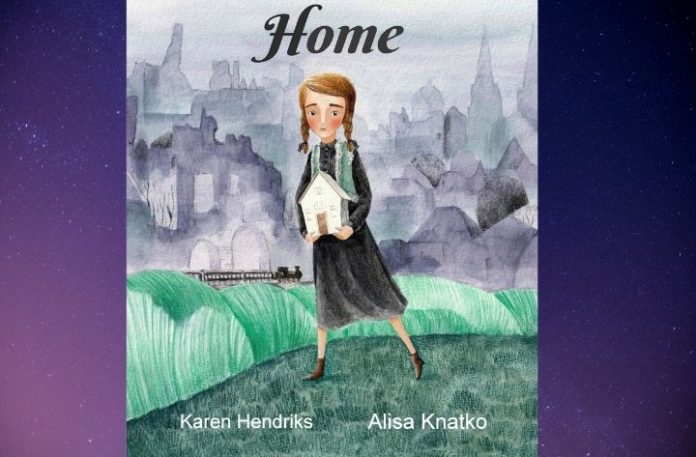Home
Karen Hendriks (author) Alisa Knatko (illustrator)
Daisy Lane Publishing, $18.95
“In a snowy mountain village, my family had lived peacefully for hundreds of years …” – so begins Karen Hendriks’ new picture book for children aged 7 and upwards.
The narrative continues with guards forcing the peaceable villagers to leave their homes taking no more than they can carry.
The little girl at the centre of the story has a locket sewn into her jacket by her mother for safe keeping believing it holds “the voices and songs of our village”.
The locket gives her hope as she travels with her parents far from their beloved homeland into the unknown.
The family sleeps on a cold floor in a crowded building. They’re led to a forest camp where the girl collects firewood and mushrooms. They’re forced to board a train from where she notices many buildings and homes have been destroyed and realises her own village while not destroyed is lost forever.
This poignant tale is inspired by the author’s mother, grandmother and great grandmother who were born in the snowy village of Wunschendorf but forced to leave it in 1946 after WW2 along with the village’s entire ethnic German population.
They were among three million Sudeten Germans expelled from the Sudeten mountains to Germany, Austria and the Soviet Zone – the largest forced refugee movement of a single population in the 20th Century.
“Now, any evidence of Wunschendorf, the village, has almost disappeared,” Hendriks writes in the book’s dedication, “even its name. It is now called Srbska.”

Hendriks’ mother’s family were part of the post-war wave of migration that saw many people travel from Europe to Australia to find work and begin a new life.
Home celebrates their courage and contribution to Australia’s multicultural heritage – a rich legacy for the generations that followed.
“Mum’s family was one of those families that bravely chose to travel to Australia by sea, after passing all the required tests and being approved by the Australian government,” Hendriks says, “leaving behind the tears of war for new beginnings.
“It takes great bravery to choose to leave what you know and come to an unknown country but it’s ultimately enabled me to have the life I do in Australia.”
Although Hendriks’ mother was only a baby when the family had to flee Wunschendorf, the generational imprint of the journey remains.
“We are all connected through time and objects to places, and home can mean many things to different people,” Hendriks says.
Her treasured heart locket is her link to Wunschendorf and features in Home as a character.
“Your cultural heritage does link you to places and people even if you have never met.
“Researching and writing Home was an emotional journey – and I discovered more about my family heritage than I’d ever imagined.
“Happily, I also found an online site created by Sophie Dixon in the UK for those remaining survivors from the village. It has photographs and stories of Wunschendorf from the past and how it is today. The family home is still standing!”
In this slim volume, Hendriks tells a powerful story of forced migration. Timely, too, when we know that, in 2020, nearly 82.4 million people were forcibly displaced around the world, and Covid-19 is said to have rendered thousands of refugees and asylum seekers stranded and vulnerable.
Alisa Knatko’s illustrations convey the darkness and fear these migratory journeys hold but also the resilience shown by the dispossessed people who have no choice but to make them.
Home captures a moment in time and gives it resonance: It is history offered with heart, fiction told with fervour, a little locket of hope I found uplifting.
_______________





